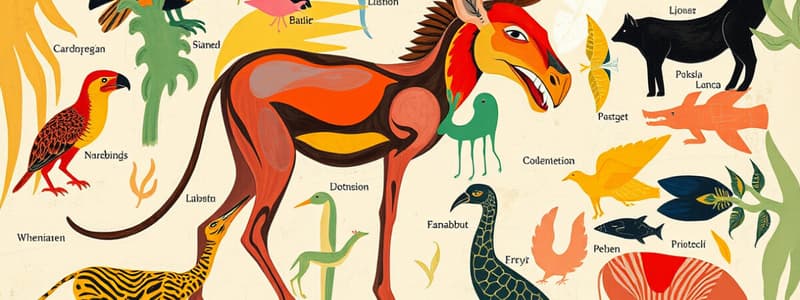Podcast
Questions and Answers
What is the primary focus of entomology?
What is the primary focus of entomology?
- The study of mammals
- The study of fish
- The study of reptiles and amphibians
- The study of insects (correct)
Which branch of chemistry deals with carbon-containing compounds?
Which branch of chemistry deals with carbon-containing compounds?
- Physical Chemistry
- Inorganic Chemistry
- Organic Chemistry (correct)
- Analytical Chemistry
What does the pH scale measure?
What does the pH scale measure?
- The density of a solution
- The concentration of ions in a solution
- The temperature of a solution
- The acidity or alkalinity of a solution (correct)
Which concept explains the process of organisms adapting to their environment?
Which concept explains the process of organisms adapting to their environment?
Which type of bond involves the sharing of electron pairs between atoms?
Which type of bond involves the sharing of electron pairs between atoms?
What is the primary subject of study in mammalogy?
What is the primary subject of study in mammalogy?
Which process involves the transformation of reactants into products?
Which process involves the transformation of reactants into products?
What does the periodic table represent?
What does the periodic table represent?
Flashcards are hidden until you start studying
Study Notes
Zoology
-
Definition: Zoology is the scientific study of animals, their behavior, physiology, classification, and distribution.
-
Branches:
- Entomology: Study of insects.
- Ornithology: Study of birds.
- Ichthyology: Study of fish.
- Mammalogy: Study of mammals.
- Herpetology: Study of reptiles and amphibians.
-
Key Concepts:
- Animal Classification: Organisms classified into Kingdom Animalia, Phyla, Classes, Orders, Families, Genera, and Species.
- Evolution: Understanding of natural selection, adaptation, and speciation.
- Physiology: Study of animal functions and processes (e.g., circulatory, respiratory, and nervous systems).
- Behavior: Includes instinct, learning, and social behaviors in animals.
-
Ecology: Study of animal interactions with their environment and ecosystems.
Chemistry
-
Definition: Chemistry is the branch of science that studies the composition, structure, properties, and changes of matter.
-
Subfields:
- Organic Chemistry: Study of carbon-containing compounds.
- Inorganic Chemistry: Study of inorganic compounds, metals, and minerals.
- Physical Chemistry: Study of the physical properties and behavior of chemical systems.
- Analytical Chemistry: Techniques for analyzing substances to determine their composition.
-
Key Concepts:
- Atoms and Molecules: Basic building blocks of matter; atoms consist of protons, neutrons, and electrons.
- Chemical Bonds:
- Ionic Bonds: Electrostatic attraction between oppositely charged ions.
- Covalent Bonds: Sharing of electron pairs between atoms.
- Reactions: Processes where reactants transform into products.
- Types of Reactions: Synthesis, decomposition, single replacement, double replacement, combustion.
- pH Scale: Measures acidity or alkalinity of a solution (0-14 scale).
-
Thermodynamics: Study of energy changes in chemical reactions, including concepts like enthalpy, entropy, and Gibbs free energy.
-
Periodic Table: Arrangement of elements based on increasing atomic number and similar properties; groups and periods indicate relationships among elements.
Zoology
- Zoology involves the scientific exploration of animal life, focusing on behavior, physiology, classification, and distribution.
- Major branches of zoology include:
- Entomology: Investigates insect species and their roles in ecosystems.
- Ornithology: Studies various bird species, their behaviors, and habitats.
- Ichthyology: Examines fish, including their physiological adaptations and ecological importance.
- Mammalogy: Focuses on mammals, exploring diverse species’ adaptations and evolutionary history.
- Herpetology: Concerned with reptiles and amphibians, studying their biology and conservation.
- Key concepts in zoology encompass:
- Animal Classification: Organizes life into hierarchical taxonomic ranks leading from Kingdom Animalia down to Species.
- Evolution: Centers on natural selection processes, adaptations, and the phenomenon of speciation influencing animal diversity.
- Physiology: Analyzes various bodily functions such as circulatory, respiratory, and nervous systems in animals.
- Behavior: Explores instinctual and learned behaviors, as well as social interactions among different species.
- Ecology: Investigates how animals interact with their environments and contribute to ecosystem dynamics.
Chemistry
- Chemistry examines matter’s composition, structure, properties, and the transformations it undergoes.
- Chemists break the field into several subfields including:
- Organic Chemistry: Studies compounds mainly composed of carbon, focusing on their structures and reactions.
- Inorganic Chemistry: Investigates inorganic compounds such as metals and minerals.
- Physical Chemistry: Looks at the physical properties and behaviors of chemical systems, relating to thermodynamics and kinetics.
- Analytical Chemistry: Involves techniques to analyze substances to ascertain their chemical composition.
- Core concepts in chemistry are:
- Atoms and Molecules: Fundamental units of matter, with atoms made up of protons, neutrons, and electrons.
- Chemical Bonds: Interaction between atoms, including:
- Ionic Bonds: Formed through the attraction between charged ions.
- Covalent Bonds: Created by the sharing of electron pairs between atoms.
- Reactions: Processes where reactants undergo transformations to form products.
- Types of Reactions: Includes synthesis, decomposition, single and double replacement, and combustion reactions.
- pH Scale: A logarithmic scale ranging from 0 (strongly acidic) to 14 (strongly alkaline), used to measure the acidity or basicity of solutions.
- Thermodynamics: Analyzes energy transfer in chemical reactions, with concepts such as enthalpy, entropy, and Gibbs free energy.
- Periodic Table: Organizes elements by increasing atomic number; features groups and periods that highlight similarities and relationships among elements.
Studying That Suits You
Use AI to generate personalized quizzes and flashcards to suit your learning preferences.




